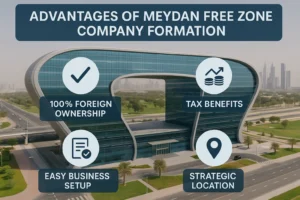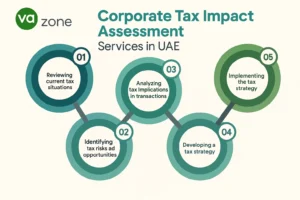
VAZONE Expert Guide
How to Easily Register for Corporate Tax in the UAE
Businesses may find it difficult to understand how to register for corporate tax in the United Arab Emirates.

Table of Contents
Corporate Tax in the UAE
Companies doing business in the Emirates are now required to abide by corporate tax laws as a result of Federal Decree-Law No. 60 of 2023. To assist your company in maintaining compliance, this document outlines the procedures needed for corporation tax registration.
This article will guide you through the entire process methodically and understandably, from setting up an account on the Federal Tax Authority’s (FTA) EmaraTax portal to submitting the necessary paperwork.
Who Must Register in the United Arab Emirates for Corporate Tax?

Companies Must Register
In the UAE, the following organizations must register for corporation tax:
- Companies operating under a commercial license.
- Companies that work in banking, real estate, development, construction, brokerage, and agency.
- Foreign companies that continue to trade or conduct business in the United Arab Emirates in order to generate revenue.
- LLCs that are newly incorporated are required to register with the FTA.
- Even if they are excluded from the 9% tax rate, small enterprises with annual revenue under AED 3 million nevertheless need to register.
- Even if they are eligible for a 0% tax rate, all free zone entities are required to register.
Companies Are Not Required to Register
- Non-residents without a permanent establishment who get revenue from the United Arab Emirates.
- Organizations that extract natural resources are already subject to Emirate taxes.
- Exemption-seeking government agencies, eligible public benefit organizations, and investment funds (registration is required prior to application for tax-exempt status).
- Branches of domestic businesses do not need separate registration because they are regarded as part of the parent firm.
Criteria for Tax Residency
People could be regarded as tax residents if they:
- Spend at least 183 days in the United Arab Emirates throughout 12 months.
- Suppose they are a citizen of the UAE or the GCC or have a UAE residency permit. In that case, they must remain in the country for at least ninety days during 12 months.
How to Register in the UAE for Corporate Tax

1. Register for an EmaraTax Portal account.
- Enter your phone number and email address to register on EmaraTax.
- Your Information will be transferred if you already have an FTA account, and you will need to change your password.
- For easy access, the portal is integrated with UAE Pass.
2. Choose the Type of Entity and Provide Information
- Select the appropriate entity type (legal or natural person).
- Present your trading license, the authorized signatory’s passport, or your Emirates ID.
- The applicant must provide proof of authorization if they are a legal person.
3. Include Owners and Business Activities
- Enter information about the owners and operations of your company.
- Your tax status and obligations are determined by the FTA using this information.
4. Complete the Online Application and Submit
- Carefully complete the corporate tax registration application.
- Send in the necessary files in Word or PDF format (no more than 5 MB per file).
- Before submitting, make sure all the Information is correct.
5. Obtain your TRN (tax registration number)
- The FTA usually processes applications in 20 business days.
- You have sixty days to provide any extra papers that may be required.
- Your Corporate Tax Registration Number (TRN), which is necessary for tax filings, will be issued to you upon approval.
Documentation Necessary for Corporate Tax Registration

1. Accounting Documents
- comprehensive financial accounts that list all of the income, costs, and deductions.
- After the applicable tax period, records must be retained for seven years.
- Tax groups must submit individual financial statements for every entity.
2. Trade Licence Legal Documents
- Memorandum of Association (MOA) or Articles of Association (AOA)
- Annual Financial Audit Report (for organizations that must have audited records)
3. Owner Identification
- Copies of owners’, partners’, and shareholders’ passports.
- Copies of Emirates IDs.
- Business contact information, such as the PO Box and complete address.
Requirements for Corporate Taxation of Foreign-Owned Companies
Suppose foreign persons or entities regularly or continuously engage in trade or business within the United Arab Emirates. In that case, they will be liable to corporate tax (CT). For corporate tax purposes, foreign natural individuals doing business in the United Arab Emirates are regarded by the legislation as “Resident Persons.
Tax Rates for Companies Owned by Foreigners
- The typical corporate tax rate of 9% for taxable income beyond USD 102,110 (AED 375,000) is something that foreign enterprises need to be aware of.
- Qualifying Free Zone Persons with taxable income up to USD 102,110 (AED 375,000) are eligible for the 0% tax rate.
The Impact of OECD Base Erosion and Profit Shifting (BEPS)
- A separate tax rate may apply to large multinational corporations that satisfy specific requirements under the OECD BEPS project.
- In order to ensure that they make equitable contributions to the global tax system and to curb tax evasion, these businesses might have to adhere to a minimum effective tax rate of 15%.
To prevent fines and non-compliance problems, foreign companies should make sure they comprehend their tax responsibilities under UAE legislation
What’s Exempt and What’s Taxed?

- Revenue from commercial trading, banking, and professional services are examples of business operations that generate taxable income.
- Revenue from commercial rental buildings in the real estate market.
- International businesses doing business or trading in the United Arab Emirates.
- Revenue from investments, including capital gains from ventures established in the United Arab Emirates.
Exemptions and Income Not Subject to Taxation
- Dividends from shares that meet specific requirements.
- Capital profits on the selling of shares (if particular requirements are fulfilled).
- Individual earnings (e.g., salaries and wages).
- Interest is received from savings plans and bank deposits.
- Corporate reorganizations and intragroup transactions (if specific requirements are satisfied).
- Revenue from investments in personal real estate
Obligations for Compliance and Reporting
By the deadlines established by the date of issuing their earliest trade license, businesses must make sure they are registered for corporate tax (CT).
Suppose a company has more than one trade license. In that case, the earliest granted license—not the most recent one—determines the registration deadline. This stops companies from using later-issued licenses to postpone corporate tax registration.
For instance:
The corporation tax registration deadline would still be based on the January 2023 license issuance if a business had a trade license issued in January 2023 but then purchased another in July 2024.
Deadlines for Filing Taxes
Within nine months following the conclusion of their fiscal year, businesses are required to file their first corporate tax return.
For natural people doing business in the United Arab Emirates, the registration date is March 31, 2025. AED 10,000 is the penalty for not registering for company tax before the deadline. Inaccurate information, inability to maintain records, and late tax filing are subject to further penalties.
Required Disclosure Conditions
Companies must be open and honest about their financial actions.
Records must be kept on file for seven years in order to comply with regulations and conduct audits.
In the UAE, Deregistering from Corporate tax

Companies can seek corporate tax deregistration with the Federal Tax Authority (FTA) if they stop operating or if they meet specific exemption requirements. This procedure is vital to prevent needless tax liabilities and fines.
Who May File a Corporate Tax Deregistration Application?
Businesses that have stopped operating in the United Arab Emirates permanently.
Companies that no longer fit the requirements for corporation taxation.
Organizations that have been dissolved or liquidated.
How to Remove Your Corporate Tax Registration
Send in a Request for Deregistration: Fill out the deregistration request form after logging into the EmaraTax site.
Provide corroborating documentation: Provide documentation of your company’s closure, exemption, or liquidation.
Pay Off Unpaid Tax Debts: Verify that all unpaid corporation tax returns and payments have been made.
Await approval of the FTA: After reviewing your request, the FTA will let you know how the deregistration is progressing.
Crucial Points to Remember
Penalties may be imposed for improper deregistration.
An audit may be carried out by the FTA prior to deregistration approval.
After deregistration, businesses are required to keep financial records for a minimum of seven years.
VA Zone’s Corporate Tax Registration
It may appear challenging to navigate company tax registration in the United Arab Emirates. However, it is achievable with the correct strategy. Registering on time guarantees that your company stays in compliance and stays out of trouble.
Our specialty at VAzone is making corporate tax registration easier for companies of all kinds. From initial registration to continuing compliance, our team of professionals offers complete support, making sure you quickly satisfy all FTA criteria.
Working with us gives you access to:
Easy tax registration and assistance with compliance
Professional guidance suited to your company’s requirements
Effective filing and documentation support
Regular tax law updates to maintain your company’s competitive
FAQs : How to Easily Register for Corporate Tax in the UAE
When is the Deadline to Register for Corporate Tax in the UAE?
The deadline depends on when your earliest trade license was issued. If you’re an individual running a business, you have until March 31, 2025, to register. Companies with multiple trade licenses must register based on the permit that was issued first to stay compliant.
Who is Required to Register for Corporate Tax in the UAE?
Any company operating under a commercial license must register. This includes businesses in banking, real estate, construction, and brokerage, as well as foreign companies earning income in the UAE. Free zone businesses also need to register, even if they qualify for a 0% tax rate.
Do Small Businesses in the UAE Need to Register for Corporate Tax?
Yes. Even if a small business earns less than AED 3 million in revenue and is exempt from the 9% corporate tax, it must still complete registration.
How Long Does It Take to Get a Tax Registration Number (TRN)?
The Federal Tax Authority (FTA) usually processes applications within 20 business days. If additional documents are needed, businesses must provide them within 60 days to prevent delays.
What Happens if I Miss the Corporate Tax Registration Deadline?
Failing to register on time results in a penalty of AED 10,000. Additional fines apply for late tax filings, incorrect information, or failure to keep proper financial records.
What Income is Taxable Under UAE Corporate Tax?
Corporate tax applies to revenue from business activities, commercial rental income, foreign business profits, and capital gains from UAE-based investments. However, personal salaries, dividends, bank interest, and qualifying intra-group transactions are exempt.
Do Sole Establishments Have to Register for Corporate Tax?
Yes, sole establishments with an annual turnover of more than AED 1 million must register and file tax returns. Even though an individual owns a sole establishment, it is treated as a business for tax purposes once it crosses this revenue threshold.
Are Non-Resident Individuals Required to Register for Corporate Tax?
Suppose a non-resident earns income from the UAE but does not have a permanent establishment. In that case, they are not required to register. However, they must ensure their business activities do not meet the criteria for being classified as a resident person, which would make them subject to corporate tax.
Do UAE Branches of Local Companies Need to Register Separately?
No, UAE branches of domestic companies do not need a separate registration. They are part of the parent company, which handles all corporate tax obligations. However, foreign company branches may need to register if they are deemed to have a permanent establishment in the UAE.
Can I Register Multiple Trade Licences Under One Corporate Tax Account?
Yes, if all trade licenses belong to the same legal entity, they can be registered under one corporate tax account. The registration deadline will be based on the earliest issued license. However, if different legal entities hold the licenses, each entity must register separately.
How Do I Register for Corporate Tax in the UAE?
You can register through the EmaraTax Portal by creating an account, selecting the entity type, providing business and ownership details, completing the application form, and submitting the necessary documents.
How Long Does Corporate Tax Registration Take?
Filling out the corporate tax registration form should take about 30 minutes.
Latest Posts


How to Open a Corporate Bank Account for Meydan Free Zone Company

Top 10 Best Business Ideas for Meydan Free Zone (2025)—Start Smart in Dubai

Meydan Free Zone Business Setup Cost (2025)—Affordable & Fast Setup Guide

Explore 5 Powerful License Types in Meydan Free Zone—Find the Best Fit for Your Business

Meydan Free Zone Company Setup Process (2025)—Step-by-Step Guide

Meydan Free Zone vs Other Free Zones in Dubai (2025) – Which One Is Best for You?

Top Benefits of Setting Up in Meydan Free Zone (2025)—Tax-Free & Strategic Location


Best Business Consultant Near Al Moosa Tower 1 Dubai—Expert Setup with VA Zone




Corporate Tax Return Filing in UAE Made Easy | Step-by-Step Guide 2025







